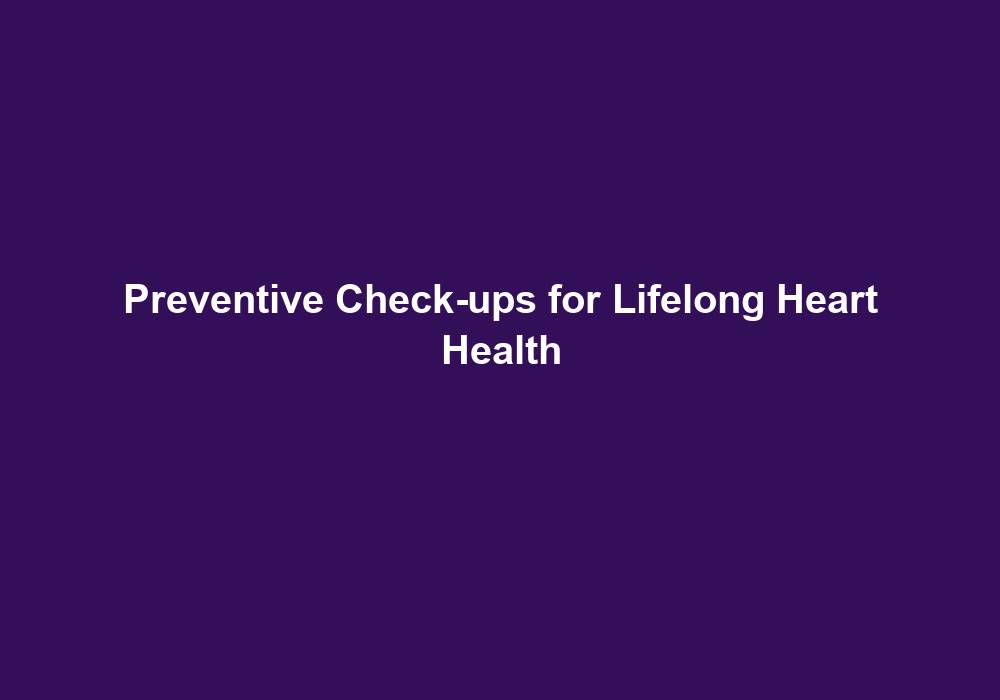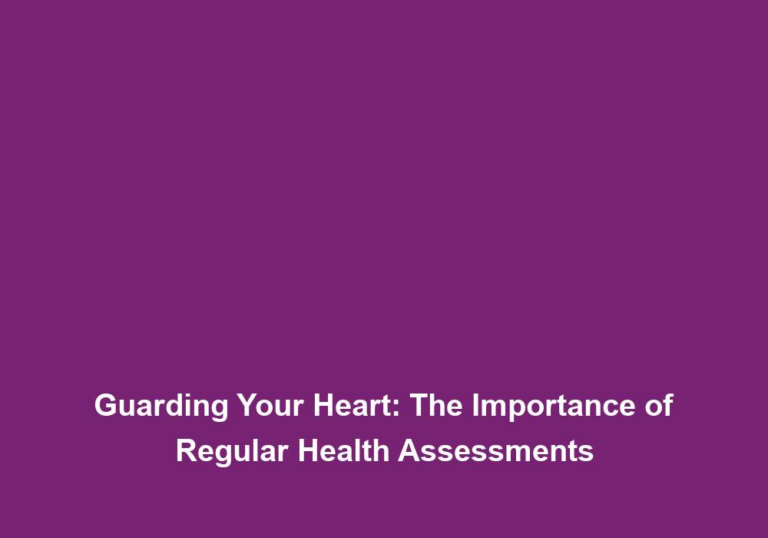Preventive Check-ups for Lifelong Heart Health
Regular check-ups are essential for maintaining lifelong heart health. By proactively monitoring your cardiovascular system, you can detect potential issues early on and take necessary steps to prevent heart disease. In this article, we will discuss the importance of preventive check-ups, the recommended frequency, and the key tests and examinations involved.
Why are Preventive Check-ups Important?
Heart disease is a leading cause of death worldwide, and many individuals are unaware of their risk factors until it’s too late. Preventive check-ups play a vital role in identifying potential heart-related problems before they become severe. By detecting risk factors and underlying conditions early, you can adopt lifestyle changes and receive appropriate treatment to mitigate the risks.
Regular preventive check-ups can:
-
Identify risk factors: Regular check-ups allow healthcare professionals to assess your overall health and identify risk factors associated with heart disease, such as high blood pressure, abnormal cholesterol levels, and diabetes. By knowing your risk factors, you can take proactive steps to manage them effectively.
-
Detect underlying conditions: Some heart-related conditions, such as arrhythmias or previous heart attacks, may not present noticeable symptoms early on. Through tests like electrocardiograms (ECGs), these conditions can be detected and treated promptly, preventing further complications.
-
Encourage lifestyle modifications: Preventive check-ups provide an opportunity for healthcare providers to discuss lifestyle factors that contribute to heart health. They can offer guidance on adopting a heart-healthy diet, increasing physical activity, quitting smoking, managing stress, and maintaining a healthy weight. These lifestyle modifications can significantly reduce the risk of heart disease.
-
Facilitate early intervention and treatment: Detecting heart-related problems early allows for timely intervention and appropriate treatment. For example, if high blood pressure is detected during a check-up, lifestyle changes and medication can be prescribed to manage it effectively and prevent further damage to the heart.
Recommended Frequency of Preventive Check-ups
The frequency of preventive check-ups may vary depending on your age, medical history, and overall health. However, it is generally recommended to have a comprehensive heart health evaluation at least once every two years. This timeframe allows for the detection of potential issues before they become more serious.
Individuals with existing heart conditions or high-risk factors may need more frequent check-ups, as advised by their healthcare provider. It’s essential to follow the recommended frequency to ensure early detection and effective management of heart disease risk factors.
Key Tests and Examinations
During a preventive check-up, several tests and examinations are typically conducted to assess your heart health. These tests provide valuable insights into your cardiovascular system and help identify potential risks. Some of the key tests and examinations include:
1. Blood Pressure Measurement
High blood pressure, also known as hypertension, is a significant risk factor for heart disease. However, it often goes unnoticed without regular check-ups. Measuring your blood pressure during a check-up allows healthcare professionals to identify hypertension early on, enabling timely intervention and management. High blood pressure can be managed through lifestyle changes, such as adopting a low-sodium diet, regular exercise, and stress reduction techniques. In some cases, medication may also be prescribed.
2. Cholesterol Profile
An abnormal cholesterol level can contribute to the buildup of plaque in the arteries, leading to heart disease. Regular screening helps assess your cholesterol levels and guides lifestyle modifications or medication interventions if needed. The cholesterol profile typically includes measuring total cholesterol, LDL (bad) cholesterol, HDL (good) cholesterol, and triglyceride levels. Based on the results, healthcare professionals can recommend dietary changes, exercise routines, and, if necessary, cholesterol-lowering medications.
3. Electrocardiogram (ECG)
An ECG is a non-invasive test that records the electrical activity of your heart. It can detect irregularities in heart rhythm, identify previous heart attacks, and provide insights into overall heart health. During an ECG, electrodes are placed on your chest, arms, and legs to record the electrical impulses generated by your heart. The results are then analyzed by healthcare professionals to identify any abnormalities. If any irregularities are detected, further diagnostic tests or treatments may be recommended.
4. Stress Test
A stress test, also known as an exercise stress test, evaluates your heart’s response to physical exertion. It helps identify potential blockages in the coronary arteries and assesses your overall cardiovascular fitness. During a stress test, you may be asked to walk on a treadmill or pedal on an exercise bike while your heart rate, blood pressure, and ECG are monitored. This test can help determine if there are any underlying coronary artery disease or heart rhythm abnormalities that may require further investigation or treatment.
5. Body Mass Index (BMI) Calculation
Calculating your BMI helps determine if you are at a healthy weight. Excess weight can strain your heart and increase the risk of heart disease. During a check-up, your healthcare provider can calculate your BMI using your height and weight measurements. If your BMI indicates that you are overweight or obese, your healthcare provider can develop a personalized plan to achieve and maintain a healthy BMI. This may involve a combination of dietary changes, increased physical activity, and behavioral modifications.
6. Blood Glucose Testing
High blood sugar levels can damage blood vessels and increase the risk of heart disease. Regular blood glucose testing is crucial, especially for individuals with diabetes or prediabetes. During a preventive check-up, your blood glucose levels may be measured through a fasting blood test or an HbA1c test. These tests provide valuable information about your blood sugar control and help determine if additional interventions, such as medication adjustments or lifestyle modifications, are necessary.
7. Family History Assessment
Your family’s medical history can provide valuable insights into your own risk of developing heart disease. By understanding your family’s health background, your healthcare provider can tailor preventive strategies specific to your needs. If there is a history of heart disease, high blood pressure, or other cardiovascular conditions in your family, it’s important to inform your healthcare provider during the check-up. This information can guide the selection of appropriate tests and interventions to mitigate your risk.
8. Lifestyle Counseling
In addition to the aforementioned tests and examinations, preventive check-ups often involve discussions about lifestyle factors that affect heart health. Your healthcare provider may provide recommendations regarding diet, exercise, smoking cessation, stress management, and other lifestyle modifications to reduce your risk of heart disease. These counseling sessions aim to empower you with the knowledge and tools necessary to make positive changes in your daily life. By adopting a heart-healthy lifestyle, you can significantly improve your heart health and overall well-being.
Take Control of Your Heart Health
Preventive check-ups are a proactive approach to lifelong heart health. By scheduling regular evaluations and following through with necessary lifestyle changes or treatments, you can significantly reduce your risk of heart disease. Remember, prevention is always better than cure, and investing in your heart health today can lead to a healthier tomorrow. Make it a priority to prioritize your heart health and take control of your well-being.







